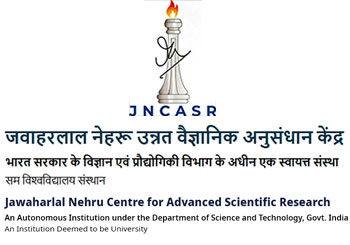FAQ
Questions on Academics@JNCASR
Ph. D., M.S. ( Research) /M.S. (Engg.), M.Sc. Chemistry, M.Sc. Interdisciplinary Biosciences, Master of Science (M.S.) in Physical Science, Master of Science (M.S.) in Chemical Science and Master of Science (M.S.) Biological Science.
We have launched a new programme; Integrated B.S. (Research)- Ph.D. The degrees that will be awarded would be Bachelor of Science(Research) or Master of Science (Research) in the area offered, depending on the degree completion requirements.
Jawaharlal Nehru Centre for Advanced Scientific Research (JNCASR), Bangalore is a Deemed University. Hence, JNCASR awards degrees.
No. There is no relation between the two. The two are independent entities.
It depends on your degree and your specialization. Check out the eligibility matrices for admissions from /admission/degree-programmes
The fee per year is Rs. 15,000. Details are available in the Prospectus
Yes. Admitted students will receive scholarships according to CSIR/UGC norms. Currently, Junior Research Fellows in Science/Engineering (i.e., the first two years of your Ph. D.), get Rs. 37,000/- per month, and Senior Research Fellows in Science (next three years) get Rs. 42,000/- per month.
Duration of the Ph.D degree? It depends. One can in principle, complete the requirements of a degree in about three years, but this is very rare. On average, it takes about 4 to 5 years. At most, a student might take 6 years. Also, please remember that Ph. D. is not like any other University degree. Research, by definition, is the study of the unknown. This is why one cannot put an exact timeframe (as in, say, that a B.Sc. degree takes 3 years to complete) for a Ph. D. work. The duration we have provided here are good estimates.
Once you get admitted, you will take basic and advanced level courses that will help you prepare for your research work. The course work typically lasts about one year (two semesters). At the end of the course work, you will start working on a research problem, which will be chosen by you and your research supervisor. The exact process may depend on the Department/Unit in which you join. You might start working on a research project in the second semester itself, so that you get a "feel" for research. On completion of two years, you will undergo a comprehensive examination (also called the pre-viva), which is somewhat like a formal registration for the Ph. D. research.
Yes. These courses are mostly taught in JNCASR. Some of the students might be asked to take specific courses in sisterly research institutions such as NCBS, IISc., RRI, if necessary.
The results of one's research work need to be disseminated among the wider community of scientists who will be interested to know it. This is formally done through a research publication, also known popularly as a ``Paper''. Such papers go through a critical peer review process, and then get accepted by the community of scientists all over the world. Of late, it is also used as a marker for the health of an institution. JNCASR publishes more than 300 research publications in international journals of repute, every year. On a per faculty count, this number is significantly higher than other institutions in India. Please follow this link https://jncasr.irins.org/
Usually, students continue their research activity. Earlier, the number of persons doing Ph. D., was much less, and the job market was large, so that one could get a teaching/research position in a University/Institution immediately after finishing Ph. D. These days, students carry out post doctoral research, either in India or abroad, after their Ph. D. Some students also join R D (Research and Development) departments of private companies, Government research establishments and the like. Also one can take up a teaching (say, Lecturer/Reader) job in Indian Universities as well, after finishing Ph. D. The few alumni of JNCASR are either doing post doctoral research in US and in Western Europe, or are working in large corporates in India. You can visit the PAIRs page for Alumni details.
So far 579 Ph. D. students have passed out of JNCASR. All of them are doing well in their career.
Right now, there are 434 research students.
Yes. A few research groups carry out both basic research as well as research that can prospectively be applied. You can visit /research/translational-research/ip-cell for details.
The research facilities are excellent, and can be found from the departmental webpages. Let me list here a few of the general infrastructure, and you can get the drift. Internet and other computing related stuff: We have round the clock, failsafe, internet connectivity. 24/7 (24 hours a day, 7 days a week) access is also provided to all computers, printers and the like, to everyone in the campus. Check out the webpage of our Computer Laboratory for more information. Communication: We talked about Internet. Let us move on to telephones. Every lab has a telephone, There is also a STD/ISD booth in the Students Residence. Power (as in Electricity): All laboratories in the campus have Uninterrrupted Power Supply, backed up by mega generators. Bottomline: Cutting Edge Research depends on guaranteed, reliable, and comfortable-to-use infrastructure. Be rest assured that this is fully taken care of at JNCASR.
I feel happy that you asked it. We believe in making the academic life of everyone a wholesome one, rather than all of us becoming linear, narrow individuals. Each Unit (department) conducts year-round seminars; Typically, in each Unit, there will be about 30 seminars per year. Please look at the seminars webpage of individual Units. Students and Faculty of the Centre present seminars on a variety of topics all through the year. You can also check out our cool, Academic Calendar for more information. The students also present weekly seminars during nights, in an informal setting. We also conduct international meetings/Conferences/Symposia regularly. We also conduct Colloquia, and Named Lectures which are delivered by world renowned experts. Typically about 2 Nobel Laureates come to our campus each year, deliver talks and interact with the students and faculty of our Centre.
Liberal. Quote from one of our Ph. D. student: "The free and frank relationship the students have with the faculty members makes the environment very suitable for working". This is also aided by the fact that most faculty members are relatively young, but well experienced in their respective fields of study. All laboratories are open 24 hours a day, 7 days a week. Researchers (the primary ones being Ph. D. students) have keys to their respective laboratories, which they can access any time of the day/night.
Sure, will. You can contact any member of the faculty, by email/letter/telephone, and they will be able to provide you with more details of their research. However, you may first want to check out their webpages to learn something about their research interests, the activities of their research group and so forth. You may also want to contact students working in their laboratory to find out more juicy (!) details on the lab. Please visit: People Page for a list of faculty, and the list of students.
Feels good to hear that. You will have to fill out some forms that you can download. If you have good marks in your B.Sc./M.Sc./M.Tech/whatever, and satisfy our qualifying norms, you will be called for an interview, based on which students will be admitted into the departments.
The interview is conducted by a team of faculty members, typically say, 4-5 people. The interview atmosphere will be friendly and congenial. The aim of the interview is to find out if (in our estimate) your skills match the grades/marks that you have obtained so far. Also, we will be able to find out your research interests during the process. We will not ask you questions on topics that you are not familiar with. Rather, questions will be asked on subjects that you have learnt. So, it is important that you prepare well for the interview, by studying your textbooks etc. The interview will be conducted normally in English. However, if you are not comfortable in English, we can conduct the interview in any other Indian language, if any of the panel members are skilled in that language.
It is in the suburbs of Bangalore city. The main railway station in Bangalore can be reached in about 40 minutes (14 km) from Jakkur, and the current airport also can be reached in about the same duration. It is situated very close to the NH7 highway (called the Bellary Road). You can always Google your way to JNCASR from anywhere in the city.
Yes, it does. There are 195 rooms in our hostels at our Jakkur campus. For more information on our Campus Life, visit Campus Life
Yes. The hostel buildings have separate floors for men and women students.
The Students' Residences have in-house Mess, with a clean, and modern kitchen. The monthly mess bill is divided among the boarders. A healthy menu is decided by representatives of students.
Yes.
Do not worry. You will do well. If needed, we shall help you out, in acclimatising to a new place. We have students from all over the country, so, you may be pleasantly surprised to find a student/person who can speak your mother tongue here.
I am once again happy that you ask this question. Most students who try to go to Western countries these days for so-called higher studies forget to take this issue into account. Educational campuses in India are relatively much safer; JNCASR is extremely safe, and a comfortable place to live and do research in. Round-the-clock, but unobtrusive security guards (wo)man the gates and the campus.
The fee details are mentioned in the prospectus
- Back to previous page
- |
-
Page last updated date:02-03-2026 02:19 PM























